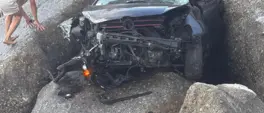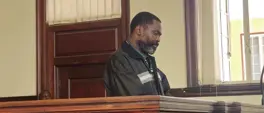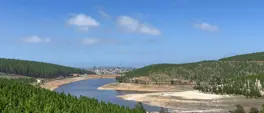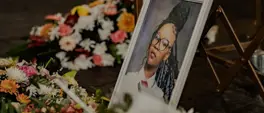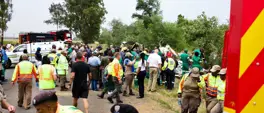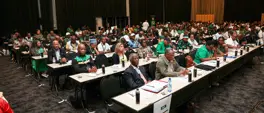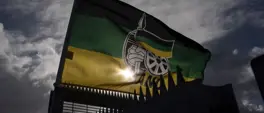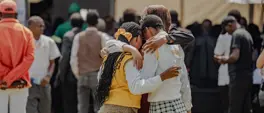Monument to post-apartheid South Africa's founding charter in ruins
AFP
12 May 2025 | 7:30The Walter Sisulu Square in Kliptown, outside Johannesburg, commemorates the Freedom Charter of principles that guided the decades-long fight that ended white-minority rule in 1994.
JOHANNESBURG - In the shade of a tree on a sunny day, Isac Matate set up a rickety bookstand in a ragged square that was once a beacon for the struggle that ended apartheid in South Africa.
Some of the books that Matate packed into the shelves held together with rope touched on the themes of the landmark: political history, black consciousness, the Bible.
The site in Kliptown outside Johannesburg commemorates the Freedom Charter of principles that guided the decades-long fight that ended white-minority rule in 1994.
Around 3,000 people of all races gathered here in a historic act of defiance 70 years ago to draw up the charter, which inspired the liberation movement and lives in the text of the post-apartheid constitution.
Its principles, such as "The People Shall Govern", "All Shall Enjoy Equal Human Rights" and "There Shall be Work and Security", are written out around what was meant to be an eternal flame.
But the flame has long been dead and the memorial - included last year in UNESCO's World Heritage Sites of "outstanding universal value" - is today in a state of neglect, vandalism and filth.
"Kliptown square is in a horrible, decaying state. It is getting worse by the day," said local resident Sphamandla Matyeni, who was perusing the titles on Matate's bookstand.
"It speaks of the fact that we do not treasure and protect what is deeply special to us as South Africans," he said.
CONGRESS OF THE PEOPLE
When Matate opened his bookshop after the memorial was inaugurated in 2005 by President Thabo Mbeki, his store was in a business complex built around a brick tower that once housed the "flame of freedom".
It was a busy time with busloads of foreign tourists arriving every day, eager to learn about the struggle that ended apartheid just years before and see where its guiding text was adopted in June 1955 at the "Congress of the People".
Business boomed, Matate said. There was a hotel, an eatery and a conference centre.
"I sold books to people who attended events during the day and night," Matate said.
"Now the square has disappeared to a point of no return."
The business centre is stripped of its roof, electricity and plumbing. When the businesses moved out, the homeless moved in.
Matate moved his bookstore outdoors, under a tree and reduced to just some shelves. Sales plummeted. "My wife left when she saw I couldn't provide for my family," he told AFP.
Known officially as the Walter Sisulu Square of Dedication in honour of a hero of the anti-apartheid struggle, the monument is listed by UNESCO as one of 14 "Nelson Mandela Legacy Sites" of "human rights, liberation and reconciliation".
DOWNHILL
Post-apartheid South Africa has battled to realise some of the aspirations of the Freedom Charter, with the legacy of racial inequality keeping the country's levels of economic disparity among the highest in the world.
As people weaved between taxis beeping for customers on a bustling street nearby, resident Smangele Mashiya said the Kliptown memorial's fortunes were hurt by the international shutdowns during the COVID-19 pandemic.
Then in 2021 local political unrest "pushed it further downhill", he said.
As locals bemoan the lost opportunities of having a key landmark in their neighbourhood, a spokesman for the Johannesburg Property Company, which manages the site, told AFP it was appointing a team to oversee its "adaptive reuse and regeneration".
"This place played an important role in our lives as young people," said tour guide Jabulani Nzimande.
"I started doing my walking tours here a long time ago and through that I was able to get the opportunity to do the training course," he said.
"But visitors are not coming here like they did before," he said, citing fears of mugging as one of the problems.
"We work voluntarily with the local police to keep the square safe," he said. "We want to see the place regaining its status.”
Get the whole picture 💡
Take a look at the topic timeline for all related articles.
